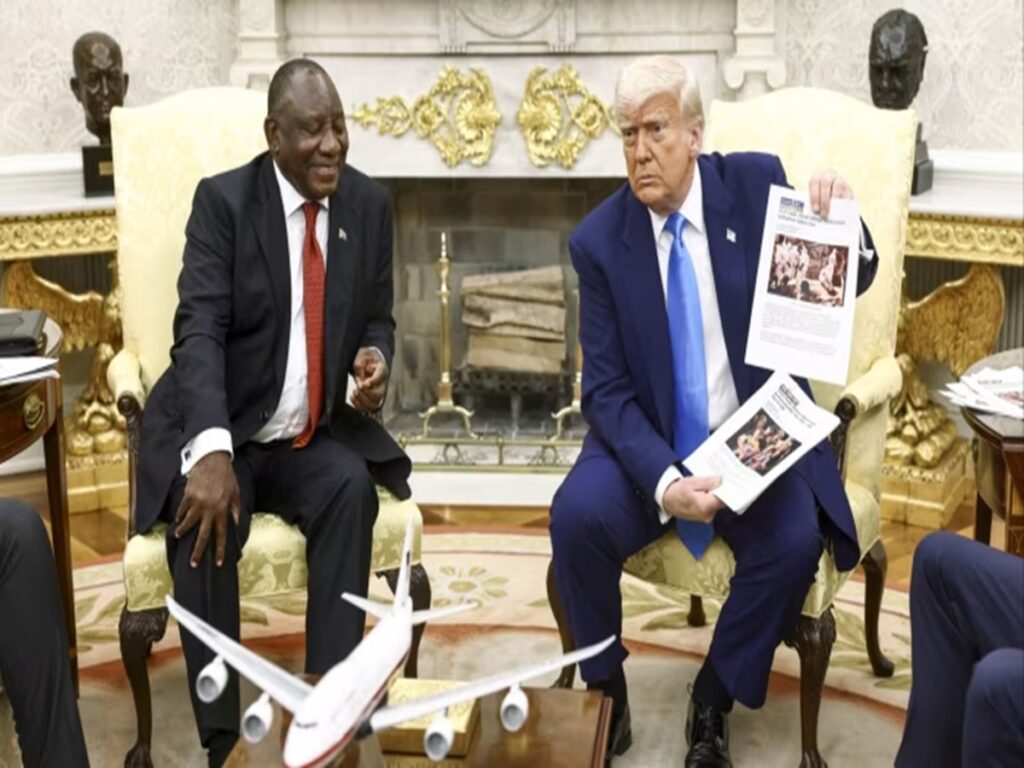New Delhi: U.S. President Donald Trump’s May 21, 2025, Oval Office meeting with South African President Cyril Ramaphosa turned contentious when Trump accused South Africa of a “genocide” against white farmers, presenting a video screenshot he claimed depicted their mass burials. The image, however, was from a Reuters video filmed in Goma, Democratic Republic of Congo, showing humanitarian workers handling body bags after clashes with M23 rebels, not South Africa. The blunder, exposed by Reuters’ fact-check team, has sparked global scrutiny of Trump’s tactics, with critics accusing him of peddling far-right conspiracy theories to corner Ramaphosa. Despite the controversy, Trump’s supporters praise his confrontational style, while Ramaphosa’s calm rebuttal highlighted South Africa’s broader crime challenges, not racial targeting.
The Congo Footage Fiasco
During the White House meeting, Trump held up a printout from a blog post by American Thinker, a conservative U.S. outlet, claiming it showed “white farmers being buried” in South Africa. The image, captioned only as a “YouTube Screen Grab,” was traced to a February 3, 2025, Reuters video documenting a mass burial in Goma, Congo, following violence involving Rwanda-backed M23 rebels. Reuters journalist Djaffar Al Katanty expressed shock, stating, “Trump used my footage to falsely claim white people are being killed by Black people in South Africa.” American Thinker’s managing editor, Andrea Widberg, admitted Trump “misidentified the picture,” though she defended the blog’s narrative of racial tensions. The White House has not issued a statement on the error.
Trump’s Narrative and Far-Right Amplification
Trump’s claims align with a long-standing far-right conspiracy theory alleging a “white genocide” in South Africa, amplified by figures like Elon Musk and former Fox News host Tucker Carlson. He played a video featuring opposition politician Julius Malema singing “Kill the Boer,” an anti-apartheid song, falsely suggesting it reflects government policy. South African courts have ruled the song, while controversial, is not literal incitement to violence, and Malema’s Economic Freedom Fighters (EFF) party, with 9.5% of the 2024 vote, is not part of Ramaphosa’s coalition. Trump also referenced South Africa’s 2024 Expropriation Act, claiming it enables land seizures from white farmers, though Ramaphosa clarified no land has been confiscated, and the law aims to address apartheid-era inequalities. South Africa’s Police Service reported 26,232 murders in 2024, with only 44 in the farming community, eight being farmers, and no racial breakdown, debunking claims of targeted killings.
Ramaphosa’s Measured Response
Facing Trump’s barrage, Ramaphosa maintained composure, a trait lauded by South African media for avoiding the fate of Ukraine’s Volodymyr Zelenskiy, who was berated in a similar Oval Office ambush in February 2025. Ramaphosa countered, “There is no genocide in South Africa. Crime affects all, with the majority of victims being Black.” He questioned the video’s authenticity, saying, “I’d like to know where that is,” and emphasized his government’s rejection of Malema’s rhetoric. Accompanied by white South African figures like golfers Ernie Els and Retief Goosen, and Agriculture Minister John Steenhuisen, Ramaphosa argued, “If there was a genocide, these gentlemen would not be here.” His delegation aimed to reset U.S.-South Africa ties, strained by Trump’s February 2025 aid cuts, expulsion of South Africa’s ambassador, and granting refugee status to 59 white Afrikaners.
Strained Bilateral Ties and Trump’s Motives
Ramaphosa’s visit sought to mend relations, soured by Trump’s criticism of South Africa’s land reform, its genocide case against Israel at the International Court of Justice, and alleged mistreatment of white minorities. Trump’s focus on white farmers, who own 70% of commercial farmland despite being 7% of the population, reflects his appeal to white nationalist supporters, with posts on X from groups like the Solidarity Movement praising him for “exposing” South Africa’s “farm murder crisis.” Critics, including NAACP President Derrick Johnson, condemned Trump’s “disgusting” racial divisiveness, suggesting the ambush distracted from domestic issues like his stalled Ukraine peace efforts. South Africa’s high crime rate—45 murders per 100,000 people in 2023—impacts all communities, with Steenhuisen noting rural safety challenges but rejecting racial motives.
Global Reaction and What’s Next
The incident has divided sentiment. Afrikaner right-wing groups celebrated Trump, with Solidarity’s Jaco Kleynhans suggesting he deserves a Nobel Prize, while South African columnist Pieter du Toit called it a “misinformation-fueled ambush.” On X, users like @Reuters highlighted Trump’s reliance on debunked claims, while MAGA supporters lauded his “boldness.” Ramaphosa’s team, including Land Reform Minister Mzwanele Nyhontso, described the meeting as “uncomfortable” but praised his restraint. With U.S.-South Africa trade facing 30% tariffs from July 2025, and South Africa hosting the G20, Ramaphosa’s push for economic cooperation hangs in the balance. Trump’s error may weaken his credibility, but his base remains energized, potentially escalating tensions as South Africa navigates its complex racial and economic landscape.


